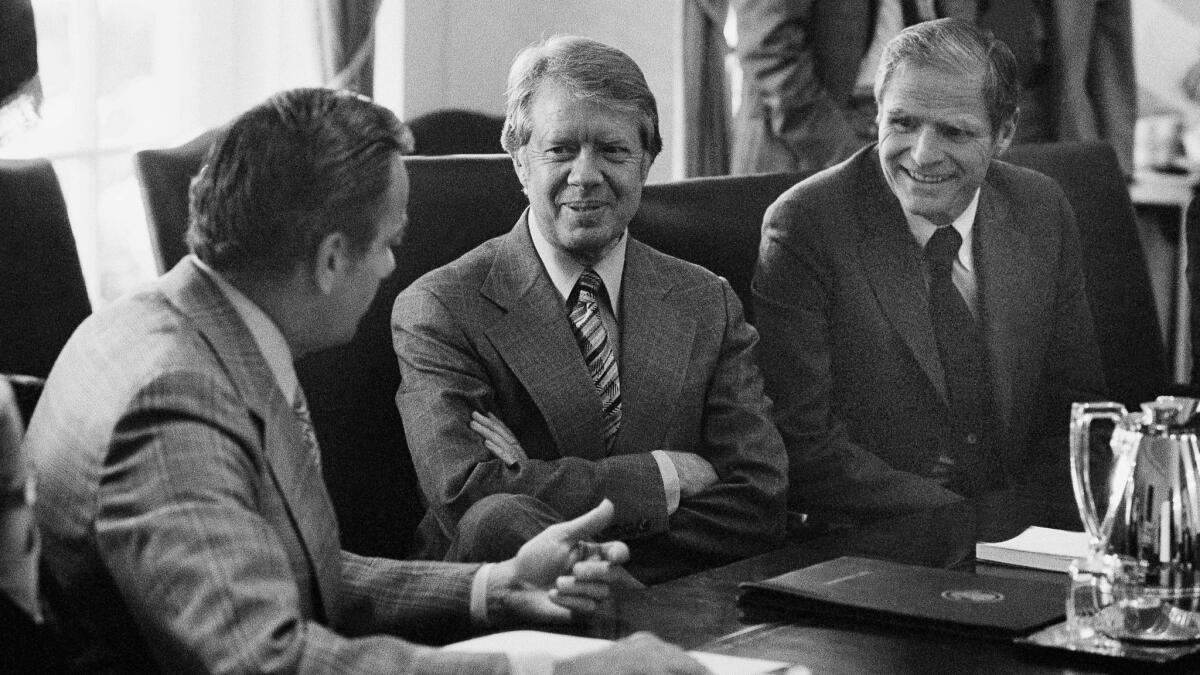Op-Ed: Democrats these days hate deregulation, but once upon a time they loved it

- Share via
When President Trump bragged in his first State of the Union address that “we have eliminated more regulations in our first year than any administration in the history of our country,” the response from Democrats was not surprising.
“Deregulation,” warned Center for American Progress senior adviser Sam Berger in Fortune, “is simply a code word for letting big businesses cut corners at everyone else’s expense.”
Such a jaundiced definition of the term, routine though it may be on the contemporary left, would be unrecognizable to leading Democratic politicians of the late 1970s, including the president who jump-started the modern notion of deregulation: Jimmy Carter. Reclaiming that lost history may soon prove crucial in an era marked by unsustainable public sector spending obligations.
“We really need to realize that there is a limit to the role and the function of government,” Carter said in his first State of the Union address, in 1978. “Bit by bit we are chopping down the thicket of unnecessary federal regulations by which government too often interferes in our personal lives and our personal business.”
If that sounds more like your conception of Ronald Reagan than the peanut farmer from Plains, it may be time to check your premises.
After televised hearings chaired by Democratic Sen. Ted Kennedy, based on academic spade-work by the liberal economist Alfred Kahn, featuring testimony from consumer advocate Ralph Nader, Carter in 1978 signed the death warrant for the Civil Aeronautics Board, thus breaking up the regulatory cartel that had kept the same four national airlines virtually unchallenged the previous four decades.
Thus began a federal assault on “price and entry” regulations, or rules that determine which companies can compete in a given industry and what they’re allowed to charge.
Carter/Brown enthusiasm for deregulation was borne partly out of desperation.
Carter also lifted individual prohibitions, most notably (thanks to an amendment by California Democratic Sen. Alan Cranston) on brewing beer at home. Result? You’re drinking it. There were fewer than 50 breweries in the United States when Carter deregulated basement beer-making; now there are more than 5,000. In two generations, America went from world laughingstock to leader in the production of tasty lagers and ales.
Such was Carter’s conviction about deconstructing chunks of the administrative state that he dwelled on it at length in his only presidential debate with Reagan.
“I’m a Southerner, and I share the basic beliefs of my region [against] an excessive government intrusion into the private affairs of American citizens and also into the private affairs of the free enterprise system,” he said. “We’ve been remarkably successful, with the help of a Democratic Congress. We have deregulated the air industry, the rail industry, the trucking industry, financial institutions. We’re now working on the communications industry.”
Here in California, then fresh off its Proposition 13 tax revolt, Jerry Brown, in his first stretch as governor, was sounding similar themes. Government must “strip away the roadblocks and the regulatory underbrush that it often mindlessly puts in the path of private citizens,” Brown said during his bracingly anti-statist second inaugural address in 1979. “Unneeded licenses and proliferating rules can stifle initiative, especially for small business….[M]any regulations primarily protect the past, prop up privilege or prevent sensible economic choices.”
These insights from the Disco Era are sorely needed today, particularly on the state and local level, where much of the price-and-entry regulatory action takes place. In the ’70s, around one job in every 10 required a government-enforced occupational license; now the ratio is closer to one in three. As Kahn and other liberal economists could have told you, those licensing boards tend to be shaped by industry incumbents, who are incentivized to protect their turf.
So you have such insane regulations as Arizona’s prohibition — punishable by up to six months in jail! — on using a blow dryer without a license, or Washington D.C.’s proposal that all day-care providers have a college degree. As ever when it comes to heavy-handed government, poor and minority populations are hardest hit.
Carter/Brown enthusiasm for deregulation was borne partly out of desperation: Inflation had been haunting the country for 15 unrelenting years, the natives were getting restless about predatory government, and politicians were desperate to find any low-hanging fruit.
We may be entering similarly fraught times.
With Congress set to jack the federal deficit back near the $1-trillion level right at the moment markets are forcing the cost of borrowing upward, interest payments will soon crowd out other categories of spending. As another Democrat, Bill Clinton, warned in 2012, “We’ve got to deal with this big long-term debt problem or it will deal with us.”
And on the state and local level, public sector pension obligations—projected to increase by 50 % in California cities over the next seven years—are already forcing bureaucrats to make unpleasant choices.
Facing budget shortfalls at every level, can governments still afford to decide who can and cannot take part in certain economic activities? It’s time they started asking: What would Jimmy Carter do?
Matt Welch is editor at large of Reason, a magazine published by the libertarian Reason Foundation, and a contributing writer to Opinion.
Follow the Opinion section on Twitter @latimesopinion or Facebook
More to Read
A cure for the common opinion
Get thought-provoking perspectives with our weekly newsletter.
You may occasionally receive promotional content from the Los Angeles Times.









